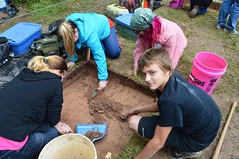4-H youth dig archaeology in southeast Arkansas
By Kelli Reep
The Cooperative Extension Service
U of A System Division of Agriculture
Fast Facts:
- Field to Report Youth Archeology Workshop held during Arkansas Heritage Month
- 4-H Youth learn research, excavation, mapping and other skills during archeological dig
- When it was time to leave, parents were dragging the children to the cars. They wanted to stay and see what other ‘treasures’ they would find.” -- Hope Bragg
(721 words)
(Newsrooms: with art at www.flickr.com/photos/uacescomm/albums/72157656425237183)
LITTLE ROCK – It takes new eyes to see the life ancient civilizations experienced. Especially in Arkansas, a state rich with artifacts from prehistory to Native Americans to pioneers, farmers and homesteaders, archaeology is rarely recognized by young Arkansans as a viable career and hobby.
Four groups are working together to change that perception: the Arkansas Archeological Survey, Arkansas Archeological Society, University of Arkansas at Monticello and Arkansas 4-H, a program of the University of Arkansas Cooperative Extension Service.
During Arkansas Heritage Month in May, these groups held the first-ever Field to Report Youth Archaeology Workshop at the Hollywood Plantation --also known as the Taylor House -- in Winchester, Arkansas.
This public education program, which included a three-day workshop and guidebook for 10 4-H students, is the first of its kind in the state. The youth went through the process of archeology from fieldwork and labs to analysis and report writing. The Department of Arkansas Heritage helped fund Field to Report Youth Archaeology as part of the heritage month’s theme, From the Delta to the Hills: Different Landscapes, a Common Heritage.
“When I started as an extension agent in Desha County in November 2013, we had very few actively involved youth and volunteers,” said Hope Bragg, Desha County extension agent with the University of Arkansas System Division of Agriculture. “I came up with the idea of doing a field day during spring break as a means to expose people to 4-H.”
That event was held in March 2014 at an archeological excavation halfway between Dumas
and McGehee at the Hollywood Plantation. The event grew into a Quad-Day where 4-H
youth from the four surrounding counties met to learn about historic and prehistoric
life then spend the afternoon assisting the archeologists in screening for artifacts. 
“We had more than 65 youth and leaders there, and they contributed more than 200 hours of service,” Bragg said. “The best part was the youth were taking part in a service project and didn’t even think of it as work. They were learning about the past, how to interpret artifacts, and the importance of properly recording evidence. When it was time to leave, parents were dragging the children to the cars. They wanted to stay and see what other ‘treasures’ they would find.”
Those treasures included pieces of transfer print ceramics, a porcelain doll’s arm and head, nails and window glass, among other artifacts. The success of this project led Bragg to collaborate with Dr. Jodi Barnes, station archeologist with the Arkansas Archeological Survey and research assistant professor with the University of Arkansas at Monticello; Dr. Ann M. Early, Arkansas State Archeologist; and Dr. George Sabo, III, the director of the Arkansas Archeological Survey; on the youth workshop.
“We are pleased with the success of this project and are actively considering how we may expand it here in Arkansas,” Barnes said. “That expansion could entail a number of programs. Our mission is to research archeological sites in Arkansas, preserve and manage information and collections from those sites, and communicate what we learn to the people of our state so this project fits squarely within our interests and responsibilities.”
“Many programs and projects across the country as well as others here in Arkansas include children in archeological activities and have been active for decades,” Dr. Sabo said. “The Arkansas Archeological Survey and the Arkansas Archeological Society sponsor every year a public archeology training program for children, adults and families, and have since 1964.”
The Field to Report workshop helped the 4-H members learn about research by encouraging questions, reviewing historic maps and aerial photographs, and training them on setting up excavation units, sampling strategies and excavating, mapping and describing soil samples. On the last day, the students not only washed, sorted and analyzed artifacts, they also interpreted their findings and drafted text for a project report, which will be published in the Arkansas Archeological Society s newsletter, Field Notes.
“The youth who participate in this program are learning there is more to archeology than Indiana Jones or Lara Croft,” Bragg said. “Archeology itself is fun and exciting without all the Hollywood special effects. 4-H was formed as a way of teaching farmers best practices through their children, and if the same principal can be applied to archeology,” hopefully, we can protect more of Arkansas’s endangered archeological resources.
For more information about archaeology in Arkansas, visit the Arkansas Archeological
Survey’s website, arkansasarcheology.org, or contact your county extension agent.
Pursuant to 7 CFR § 15.3, the University of Arkansas System Division of Agriculture offers all its Extension and Research programs and services (including employment) without regard to race, color, sex, national origin, religion, age, disability, marital or veteran status, genetic information, sexual preference, pregnancy or any other legally protected status, and is an equal opportunity institution.
# # #
Media Contact: Mary Hightower
Dir. of Communication Services
U of A Division of Agriculture
Cooperative Extension Service
(501) 671-2126
mhightower@uada.edu
Related Links